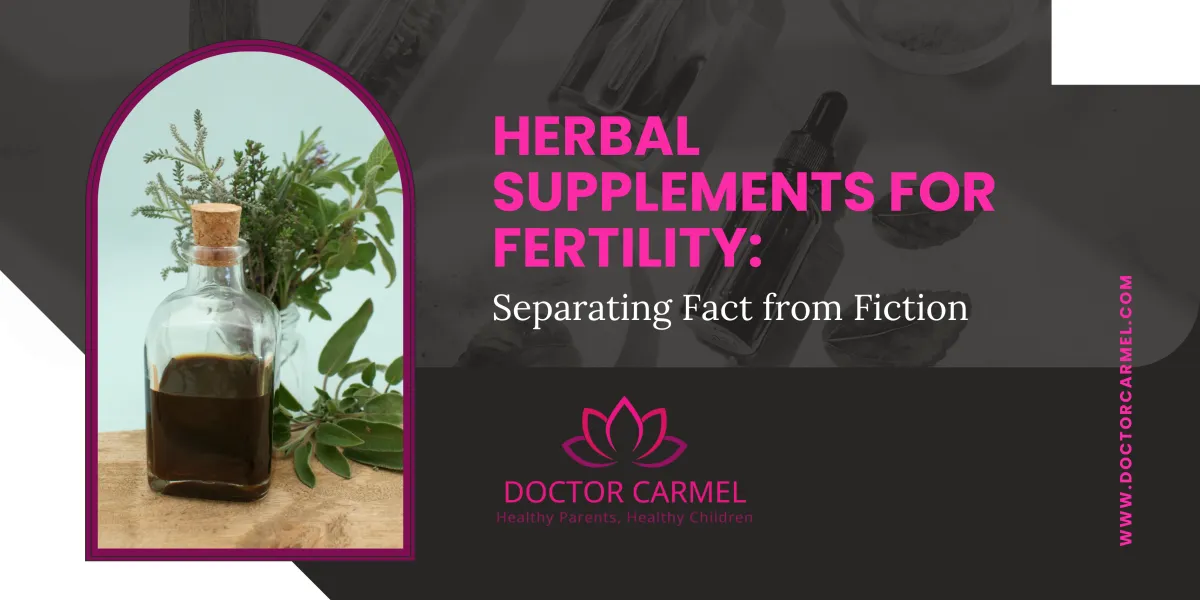
Herbal Supplements for Fertility: Separating Fact from Fiction
By Dr. Carmel Dekel Wiseman
In the quest to conceive, many individuals and couples turn to herbal remedies as a natural way to support fertility. While some herbs have centuries of traditional use and promising research behind them, others are surrounded by hype and misinformation. So how do you know what truly works—and what might be doing more harm than good?
Let’s take a closer look at some of the most popular herbal supplements used for fertility and explore the science, benefits, and potential risks behind them.
🌿 Vitex (Chaste Tree Berry)
Claim: Regulates menstrual cycles and supports progesterone production.
What the Evidence Says: Vitex has shown promise in balancing hormones, especially in cases of luteal phase defect or irregular cycles. It works by influencing the pituitary gland and may help normalize prolactin levels.
Caution: Should be used under supervision, especially if you’re already on hormonal treatments or have a regular cycle.
🌿 Maca Root
Claim: Boosts libido, energy, and hormone balance in both men and women.
What the Evidence Says: Maca is an adaptogen that may support energy and reduce stress, which is valuable for fertility. Some small studies suggest it may support sperm quality and libido, but data is limited.
Caution: Not a direct hormone modulator—think of it more as a supportive tonic.
🌿 Red Raspberry Leaf
Claim: Tones the uterus and supports pregnancy.
What the Evidence Says: Often used in the second and third trimesters for uterine strength, not specifically for conception. It's rich in nutrients but has limited evidence for fertility enhancement.
Caution: Not typically recommended during the first trimester or in high doses for preconception.
🌿 Tribulus Terrestris
Claim: Improves ovulation and supports testosterone in men.
What the Evidence Says: Some preliminary studies support its role in improving ovulation in women with irregular cycles and enhancing sperm motility in men.
Caution: Dosage and quality matter. Overuse can lead to hormone imbalances.
🌿 Ashwagandha
Claim: Reduces stress and supports hormone regulation.
What the Evidence Says: As an adaptogen, Ashwagandha helps lower cortisol (the stress hormone), which can have indirect benefits for fertility. Chronic stress is a known disruptor of ovulation and sperm production.
Caution: Should be avoided if you’re on thyroid medication or have certain autoimmune conditions unless advised by a practitioner.
⚠️ Important Note on Herbal Use
Herbs can be powerful, but that doesn’t mean they’re always safe—or suitable for everyone. The biggest risks include:
Interactions with medications or fertility treatments
Unregulated doses in over-the-counter products
Masking underlying hormonal imbalances that need deeper functional evaluation
That’s why it’s essential to consult with a qualified practitioner who understands both the holistic and medical aspects of fertility care. Remember my favorite line …. When it comes to your health “test, don’t guess”!
✅ The Bottom Line
Herbal supplements can be a valuable part of a fertility plan—but only when used appropriately, with a clear understanding of your unique needs, hormone levels, and timing.
Remember, fertility is not just about the ovaries or sperm—it’s about the whole person, and every herb affects multiple systems in the body.
Curious about which herbal remedies are right for you?
Let’s build a personalized plan that supports your body, mind, and future baby.
👉 Schedule your free 15-minute consultation now and take the first step toward empowered, evidence-based fertility care.
